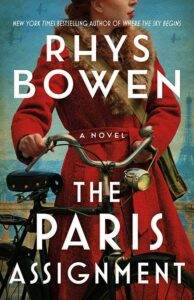 Rhys Bowen is one of the best in the biz when it comes to narrative – I think her closest peer may be Harlan Coben. With both writers, picking up one of their books means you will be subsumed by exquisite storytelling that’s impossible to look away from. Rhys Bowen trends more toward historical fiction rather than Coben’s domestic suspense model, so if that’s your jam, you can’t go wrong nabbing a copy of her latest book, The Paris Assignment.
Rhys Bowen is one of the best in the biz when it comes to narrative – I think her closest peer may be Harlan Coben. With both writers, picking up one of their books means you will be subsumed by exquisite storytelling that’s impossible to look away from. Rhys Bowen trends more toward historical fiction rather than Coben’s domestic suspense model, so if that’s your jam, you can’t go wrong nabbing a copy of her latest book, The Paris Assignment.
The story begins in 1931 Paris, when young Sorbonne students Madeline Grant and Giles Martin meet. Madeline is shy and sheltered, and Giles, the son of French nobility, is at home in Paris. Madeline, at the Sorbonne for a semester away from her English college, hadn’t even dared to leave her hostel when Giles scoops her up and introduces her to the world of coffee shops, politics, friends, and fine food. Well, you may guess where this is going – it’s 1931, but – it’s Paris! – and before long Madeline is pregnant. Giles marries her, despite being disowned by his family, and the only support they have left is Madeline’s elderly French aunt.
Madeline’s father and her controlling stepmother aren’t too pleased with her decision to remain in France, but Madeline’s mother was French, and she feels an affinity for the city. She, Giles, and baby Olivier become a happy family unit, something brought to an end by the Nazi occupation of Paris. Giles sends Madeline back to England for safety, but her parents live in London, and the blitz is on, so safety isn’t on the menu. Madeline decides to send Olivier out to the countryside with his school where he’ll be safe. Thanks to a mix up and a tragedy, Olivier is presumed dead, and Madeline, heartbroken, agrees to enter espionage work. She’s taken north to Scotland for training, wanting revenge on the Germans who took her son from her. She rarely hears from Giles who is working with the resistance in France.
Olivier, meanwhile, thanks to the mix up, thinks his family is dead, and during WWII many British orphans were sent to Australia. Oliver ends up at an orphanage run by nuns who are straight out of Joan Aiken’s The Wolves of Willoughby Chase. There were no nuns in Aiken’s book but the fictional treatment of the children in that book is not as cruel as the apparently actual treatment by the Australian nuns (there’s a short historical note at the end). The children are underfed, underclothed, overworked, and punished at the drop of a hat.
Madeline meanwhile is finding war work in occupied France equal parts nerve wracking and rewarding, and a series of terrible events leads to some horrific treatment at the hands of the Gestapo. The narrative won’t let up and it’s more than sustained by the characters of Madeline and Olivier, both of whom practically leap off the page and into your reading brain. This was a great read, full of history, heartbreak and some ultimately (mostly) positive outcomes. The book ends, but I could have kept on reading to discover more about my new fictional friends Madeline and Olivier. Long may the pen of the talented Bowen be a busy one. — Robin Agnew